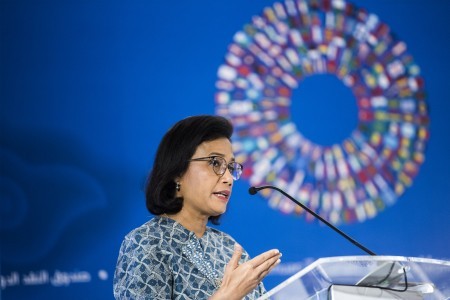Popular Reads
Top Results
Can't find what you're looking for?
View all search resultsPopular Reads
Top Results
Can't find what you're looking for?
View all search resultsMuddling through 5 percent
Preliminary data from the fiscal and monetary authorities for 2018 indicate macroeconomic stability will remain strong throughout this election year.
Change text size
Gift Premium Articles
to Anyone
P
reliminary data from the fiscal and monetary authorities for 2018 indicate macroeconomic stability will remain strong throughout this election year. The consensus analysis among most economists is that oil prices will remain below US$60 per barrel and there will be a pause in the United States Federal Reserve’s monetary tightening.
Barring any bizarre developments related to the April 17 presidential election, such as violent sentiments against foreign investors, the economy is projected to remain stagnant at the 2018 growth of 5 percent. This growth, though, still below the country’s potential economic expansion of 7 percent, is not too bad, as it is similar to the average level of growth most banks have predicted for Asia as a whole, excluding China and India, for 2019.
Finance Minister Sri Mulyani Indrawati reported that total revenues for 2018 had slightly exceeded the Rp 1.94 quadrillion ($134.2 billion) target, while spending was 0.80 percent short of the target, with the fiscal deficit standing at 1.80 percent of gross domestic product (GDP), lower than the 2.20 percent estimate. Yet, more encouraging is that the state budget for the first time since 2011 booked a primary balance (margin between total revenues and spending, excluding debt services) of Rp 4.1 trillion.
In the monetary sector, such developments are similarly comfortable with foreign reserves increasing to $120.60 billion, or equivalent to more than six months of imports. Even though the current account deficit last year was dangerously bigger than 3 percent of GDP, the overall balance of payments recorded a surplus of $4 billion owing to portfolio capital inflows, while the rupiah depreciated 6 percent and inflation checked at 3.1 percent.
The biggest downside risks to the economy remain external factors, such as the ongoing US-China trade spat, slowing global growth, which in Indonesia will negatively impact exports, and the ongoing monetary tightening in the US. However, these external downside risks could slightly be neutralized by the consensus analysis that international oil prices will remain weak, languishing between $50 and $60 per barrel. This is quite good news for the country, a net oil importer, because there is not likely to be a new wave of strong pressures on the state budget through fuel subsidies and on the current account through trade deficit.
More encouraging to the balance of payments is that most economists have predicted that there will most likely be a pause in the Fed monetary tightening.
But economists have warned against complacency because the perpetual pressures on the current account due to sluggish exports and the persistently heavy dependence of the debt and equity market on foreign portfolio investors, who are by nature highly jittery, thereby making the market vulnerable to sharp volatility.
The well-coordinated monetary, fiscal and exchange rate policies have helped the economy emerge relatively unscathed from last year’s wave of external turmoil, but continued structural reforms that will woo more direct investment and reduce other domestic vulnerabilities will strengthen economic resilience in weathering the risks of global volatility.










